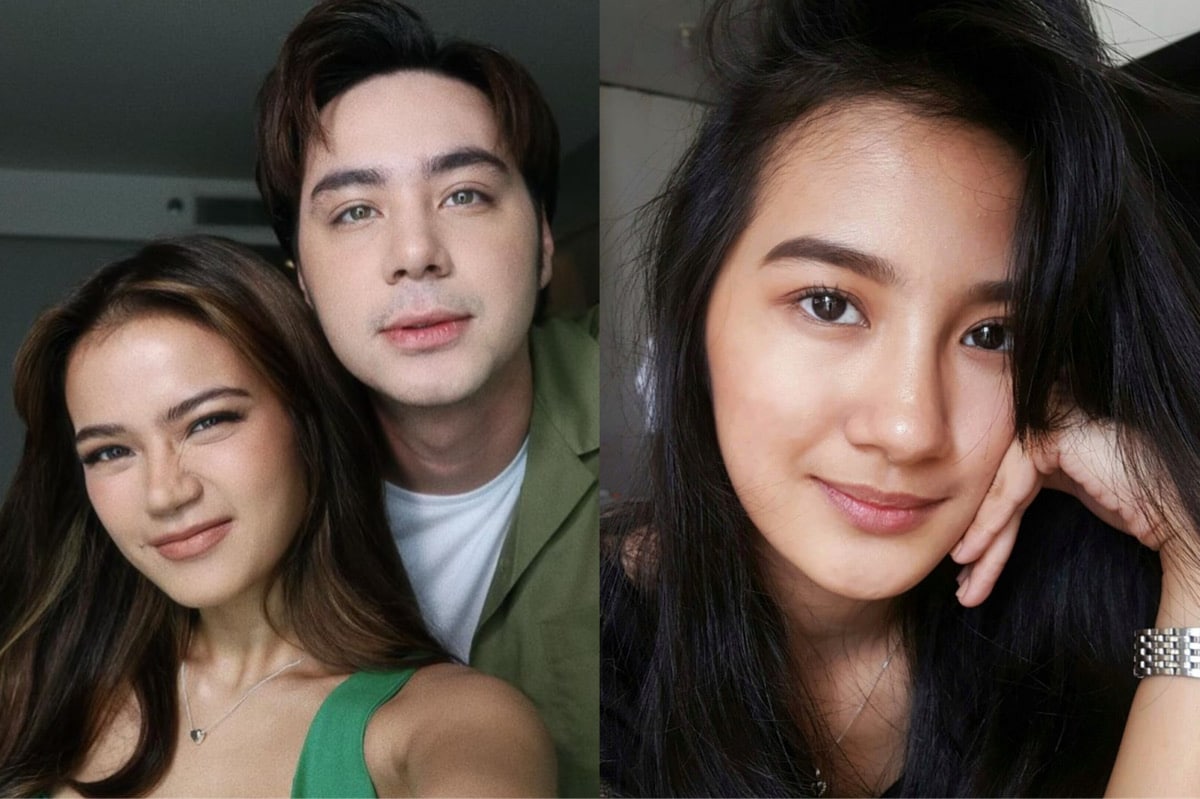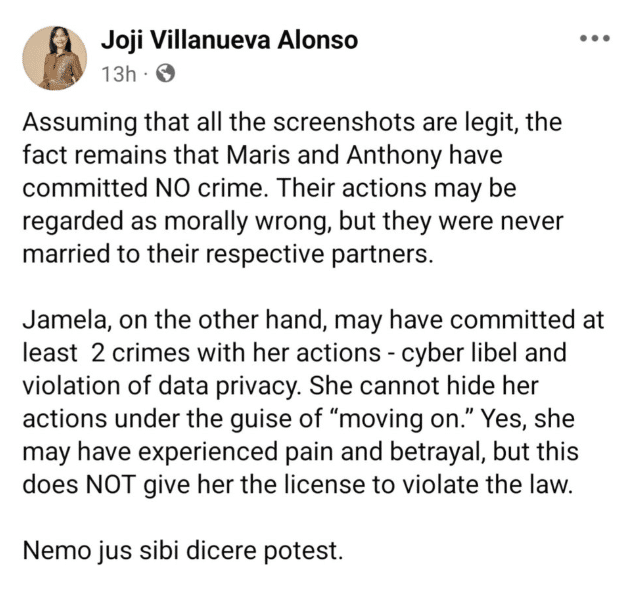Baring Maris Racal, Anthony Jennings’ private convos by ex-GF poses legal issues

Maris Racal, Anthony Jennings and his ex-girlfriend Jamela Villanueva. Image: Instagram/@mariesteller, @jamelavillanuevaa
The cheating allegations involving actors Maris Racal and Anthony Jennings made legal experts weigh in on the potential violations made by the latter’s non-showbiz ex-girlfriend, Jamela Villanueva, who publicized the intimate exchanges between the two stars.
On social media, a lawyer from the University of the Philippines Diliman, Jesus Falcis, emphasized that “cheaters have human rights,” citing the National Privacy Commission (NPC) 2020 advisory.
“Even before screenshots of text or chat messages between Maris Racal and Anthony Jennings were leaked today, many people – especially those who were cheated on – have always asked me before about the legality of posting and sharing screenshots of private conversations. I have always told them that there is such a thing called as the right to privacy. Even cheaters have human rights,” Falcis began his caption.
“The National Privacy Commission (NPC) clarified in a 2020 advisory opinion that the Data Privacy Act applies to screenshots if they reveal the identities of those involved: ‘It is worthy to note that the processing, i.e. sending out the screenshot to another person, will only come under the scope of the DPA if personal data is indeed involved—if the conversation/screenshot itself allows for the identification of the parties. If it is simply the content of the conversation, with names and other identities redacted or cropped out of the screenshot, it might not be within the scope of the DPA,’” he added.
Falcis explained that persons sharing screenshots of any alleged affair expose themselves to both cyberlibel and violations of data privacy.
Article continues after this advertisement“So even if you were the victim of cheating, by posting screenshots of any alleged affair, not only are you exposing yourself to cyberlibel charges but also to charges for violating data privacy – which is punishable by stiffer and harsher penalties than cyberlibel. And while the Supreme Court just recently said that there is no violation of the right to privacy if screenshots are used in a criminal case, that is the caveat – the screenshots must be used in a criminal case,” he stated.
Article continues after this advertisementThe UP lawyer said that the victim could file a VAW (violence against women) case, instead of publicizing his or her proof.
“Well, you should still take screenshots as evidence of cheating or an affair (especially if you’re married). Then, what you should do is instead of posting on social media is to file a VAW (violence against women) case – psychological violence caused by infidelity. And if you’re a public figure or celebrity, let the media report or cover it – then you’ll get the publicity you wanted anyway without the legal liabilities for cyberlibel and data privacy. When you present the screenshots as evidence in court, that’s when the Supreme Court ruling will apply – that taking screenshots of private conversation is not a violation of the right to privacy when used as evidence in a criminal case,” he explained.
Falcis stressed that the revelation of the intimate conversation between the two celebrities invited misogyny for Racal.
“What’s unfortunate and what I find personally wrong in leaking the screenshots of Maris Racal and Anthony Jennings through social media is the slutshaming of Maris Racal because of her supposed “thirst trap/hungry” messages. Cheating is bad. But so is misogyny, enabled by violating the right to privacy. Victims have human rights. But vindicating your rights should not make more victims,” he said.
Meanwhile, attorney and film producer Joji Villanueva Alonso said that while Racal and Jennings did not commit any crime as they were not married to their respective partners, Villanueva violated two laws.
“Assuming that all the screenshots are legit, the fact remains that Maris and Anthony have committed NO crime. Their actions may be regarded as morally wrong, but they were never married to their respective partners,” she began in a now deleted Facebook post.
“Jamela, on the other hand, has committed at least 2 crimes with her actions – cyber libel and violation of data privacy. She cannot hide her actions under the guise of ‘moving on.’ Yes, she may have experienced pain and betrayal, but this does NOT give her the license to violate the law. Nemo jus sibi dicere potest,” continued the lawyer.

Facebook/Joji Villanueva Alonso
Meanwhile, Senate President Chiz Escudero was asked in a recent press conference if it’s a violation of privacy if one posts a private conversation between two persons.
“As a lawyer, I think but again it’s an allegation that needs to be proven in court. Kasi may prinsipyo sa korte, proof of the poison tree na kapag sa illegal mo nakuha, hindi mo pwedeng gawing ebidensiya. Pero gumawa ng exception ang korte dito pwedeng gawing ebidesiya sa criminal case, hindi sa civil case para patunayan ang inosence or guilt ng akusado, pero hindi sa isang civil case para mapagbayad o mabawi ano mang ari-arian,” he explained.
(Because there is a principle in court, proof of the poison tree, that if you obtained it illegally, you cannot use it as evidence. But the court made an exception here, saying it can be used as evidence in a criminal case, not in a civil case, to prove the innocence or guilt of the accused, but not in a civil case to pay or recover any property.)